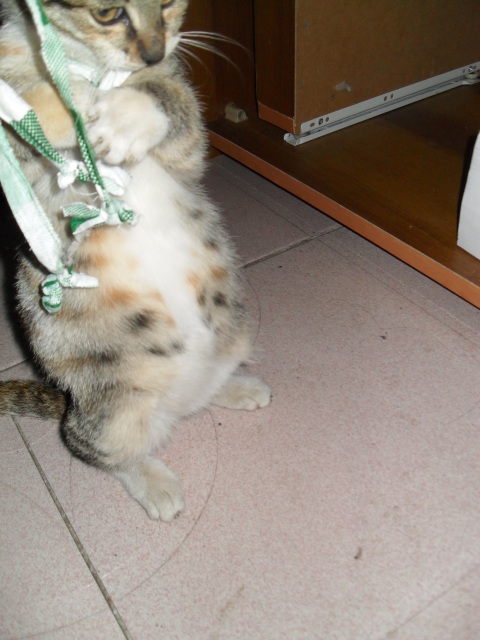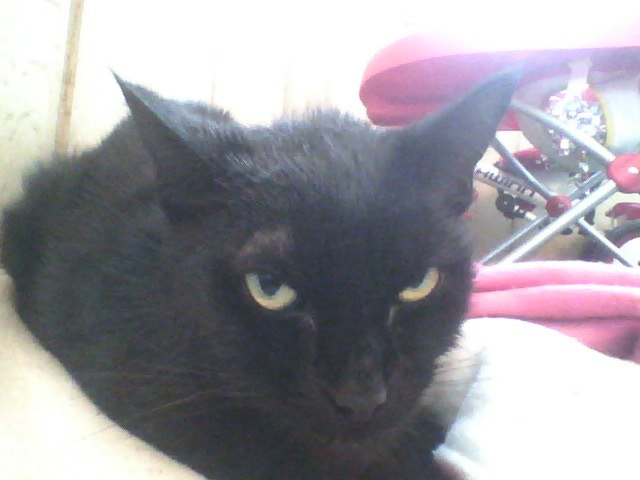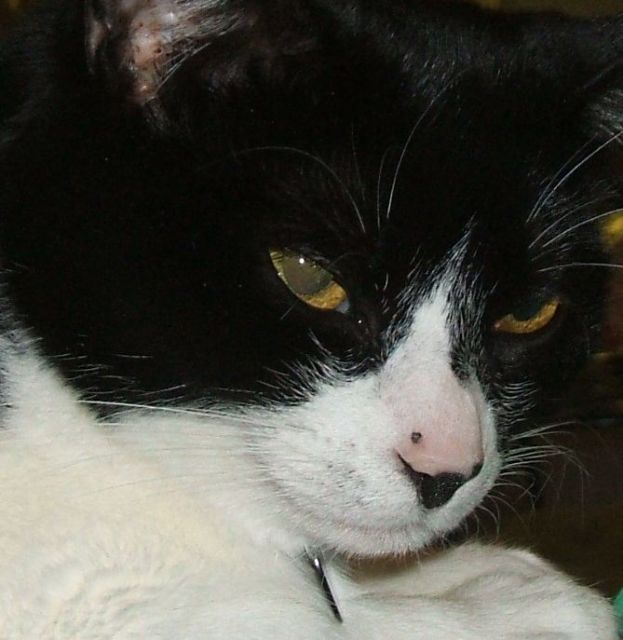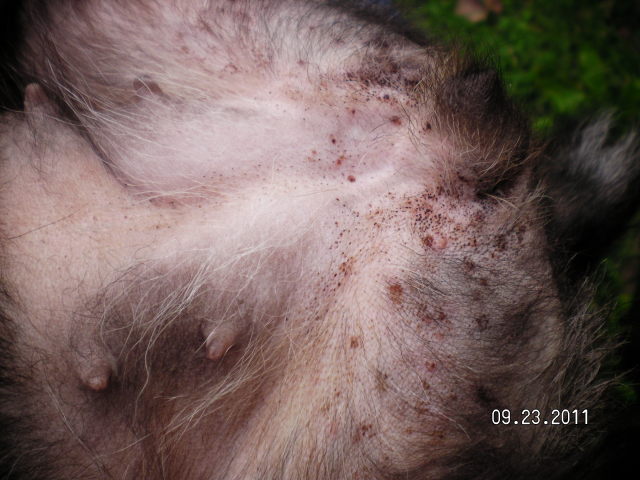QuestionI have a 4 year old sterilised female cat. I adopted her when she was 2, and she was a semi-outdoor cat for a few months, and then a strictly indoor cat. A year and a half ago, she started having cysts on side of her head filled with pus that would appear every month or two, she would scratch them and the pus would get out. After a dozen misdiagnosis and a dozen vets, a reputable vet said she has a feline calicivirus. I have read about felcv, and it makes no sense at all to me. Firstly, she had no upper respiratory infections at all, and no ulcers inside of her mouth. Also, how can she still have felcv after almost two years? And since it is a virus, and she has no infections that can be treated with antibiotics, is she going to have it all her life?
AnswerI agree. It does not sound like calicivirus. However any of the viruses can become latent, thus weakening the immune system so average things like vaccines, dry food, pollution, your stress and many others can trigger physical response. If you had merely conventional treatments, she would have it for life.
However, the holistic philosophy has taught me that there is an underlying vibrational imbalance that causes most problems (even if virus has imbalanced it) and the healing goal is to resolve that imbalance with treatments selected for that individual animal. To better understand this perspective, read the first few chapters of Don Hamilton's Homeopathic Care of Cats and Dogs or the few pages in my book, the Healthy Animal's Journal (Healthy dog is available as an ebook at www.myhealthyanimals.com. Now that the multitude of holistic modalities is available, I can tell you to never give up. Try one after the other, and record the changes with each. Contact me again if you cannot find products suggested below.
The main keys to treating her will be to feed a raw meat/pureed vegetable diet, not using chemicals like flea control or vaccines, trying ways you can learn to boost the immune system (Reiki,flower essences, herbs...your traditional medicine in Serbia) and finding an integrative veterinarian with whom to work (by internet or skype if necessary). It is really key to find an integrative vet as conventional really offers nothing. Just switching to a fresh food diet can help significantly.
finding a vet in europe - QiAcademy (chinese medicine) www.qiacademy.eu
Homeopathy - www.iavh.org
A few homeopathic veterinarians will consult by phone or email. Homeopathic veterinarians (these can often help you by phone if no other holistic practitioners are nearby that you like): www.theAVH.org and www.DrPitcairn.com.
Feed the best. What are the best diets for people or animals -- the most processed or the freshest, most organic? The best ingredients should be the most consciously raised - local, organic vegetables, free ranging protein sources. Dogs and cats have ripping and tearing teeth, bone crunching teeth, no digestive juices in the mouth, jaws that do not chew, a stomach full of acid where the food sits for 4-12 hours and a very short transit time in the intestines. Dogs and cats do not pull out a knife to de-bone their prey and do not pull out matches to light a fire to cook their meat and vegetables. Therefore the best diet for dogs and cats is raw meat including raw bones, pureed raw and cooked vegetables and a few supplements (Calcium if no bones are eaten is critical). Grains are not good for most animals, but if there are none of the early warning signs (see below) and no illnesses, you can feed some grains, preferably the higher protein ones. Start as young kittens and puppies or at whatever age you read this (Brighthaven.org, a cat sanctuary switches 16 years old and older cats to raw meat diet and some have lived to 27 and 30, and now one to 35). Second best is same quality, but cooked. Even grocery store quality meat and vegetables are much better than most processed foods. Processed foods are an effort for the food industry to use up its waste products except for a few companies with great motives (and even they sometimes get bad or inferior ingredients). Processed foods are also a problem for the environment - they are not sustainable. Many dogs and cats need probiotics. Every animal needs and wants a different combination of foods and supplements at different times in their lives depending on different stressors and health challenges, just as we do. With any food, observe each of your animals for the effect that food has on them and change if decreased energy or poor coat or other Early Warning Signs. NEVER feed DRY food to cats - even as treats. It causes most cats to drink more water resulting in stress to the kidneys and also can trigger bladder problems in cats. You can now buy many commercial raw meat diets. You must research them as well. Ask where the ingredients are raised? Are chemicals used? Are the chickens, beef, pork, etc raised in humane ways, out in the sun to get the Vitamin D in the meat, etc?
REIKI:
Personally, I think every person who lives with or works with animals must know at least Level I Reiki. The practitioner offers this energy and the animal comes over to get it (or places her hands upon the animal), or it can be done from a distance, even around the world with the intent for healing to occur. The energy flows through the healer into the animal. This is based on directly applying Chi (energy) to rebalance the energy field so it no longer needs to produce the physical symptoms. It is a very good adjunct to any healing modality, especially to relieve pain and inflammation. I have seen cats who began to eat again when their food was treated with Reiki. It also "takes the bad out of" things. By doing Reiki on smelly water in restaurants I have been able to drink sweet tasting and smelling water. Use Reiki anytime that you must give injections, vaccines, drugs, flea or heartworm drugs, or other substances with potential toxicity. Reiki is great to calm animals, relieve discomfort, and can deeply heal some problems in some animals.
1. Great information on Reiki - http://www.reikicourse.org. Kathleen Prasad is a wonderful teacher and works with my favorite sanctuary and holistic education center, BrightHaven www.brighthaven.org. Kathleen leads a free monthly telechat for anyone trained in Reiki and using it with animals.
3. http://www.animalreikisource.com/. If you cannot find a Reiki Class near you (same class for people and animals as it connects you through an "attunement" to the healing energy of the universe, making you a channel of healing), the following groups offer long distance, free, attunements.
a. http://theholisticcare.com/forums/viewtopic.php?f=6&t=13,
b. http://freereikiattunement.com/
c. www.ReikiBlessings.com offers free Reiki attunements, classes and training on-line and animal classes, too
d. Long distance healing and training is at www.animalhealers.homestead.com/
e. Christine at cbearse@earthlink.net, www.awakeningrainbows.com. To receive free distance Reiki send her your first name only, city and state, and whether or not you have had any Reiki training. She invites you to include your pets as well. She uses a teddy bear and does a full body Reiki distance treatment for one hour each Sunday evening from 9 p.m. until 10 p.m. EST.
4. www.AnimalReikiAlliance.com has articles and Maryland holistic practitioners listed.
5. http://www.reiki.org . http://www.ReikiTails.com is a great practitioner in Maryland who knows a lot about cats.
6. Get a free treatment for yourself at www.interdimensionalhealing.com.
Another wonderful healer, Deena Spears works long distance with Sound Tuning. www.Singingwoods.com. I have seen many animals and the people in a home be healed by her work. She can be grumpy sometimes, so do not be offended.
And a team of over 100 healers will send free healing energy until you say not to. Email Barbara at nancelot01@aol.com with your healing request, name of animal, species, color & age. In the subject say request through Dr. Chambreau

 Feral cat with bloated stomach
Question
Cats stomach
Hello,
Id like some help with a
Feral cat with bloated stomach
Question
Cats stomach
Hello,
Id like some help with a
 please help my cat
Questionmy cat cutie
QUESTION: hello,
my cat has
please help my cat
Questionmy cat cutie
QUESTION: hello,
my cat has
 Radioiodine treatment of hyperthyroidism in our cat
Question
Molly
Dear Jana,
I wrote you near the end of
Radioiodine treatment of hyperthyroidism in our cat
Question
Molly
Dear Jana,
I wrote you near the end of
 black spot on cats nose
Question
cat nose
Should I be concerned about the black
black spot on cats nose
Question
cat nose
Should I be concerned about the black
 dog has spots
Question
spot on back
my dog is a puggle pom mix
dog has spots
Question
spot on back
my dog is a puggle pom mix